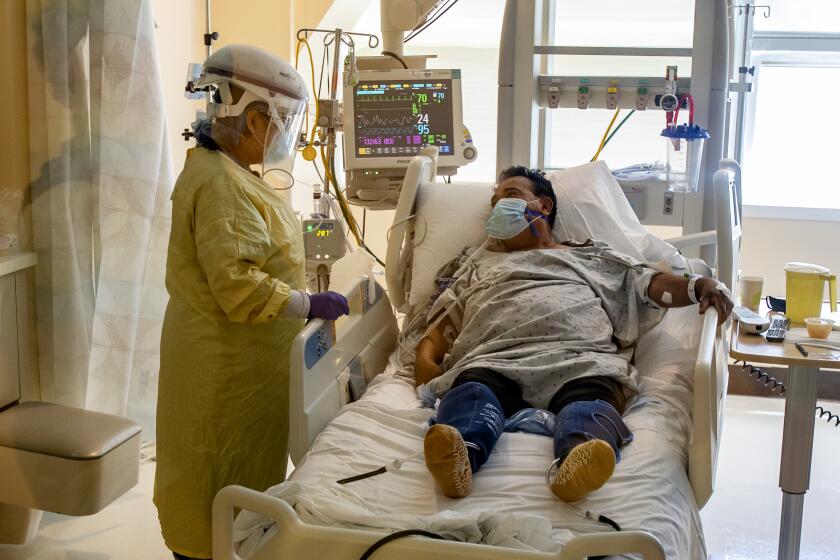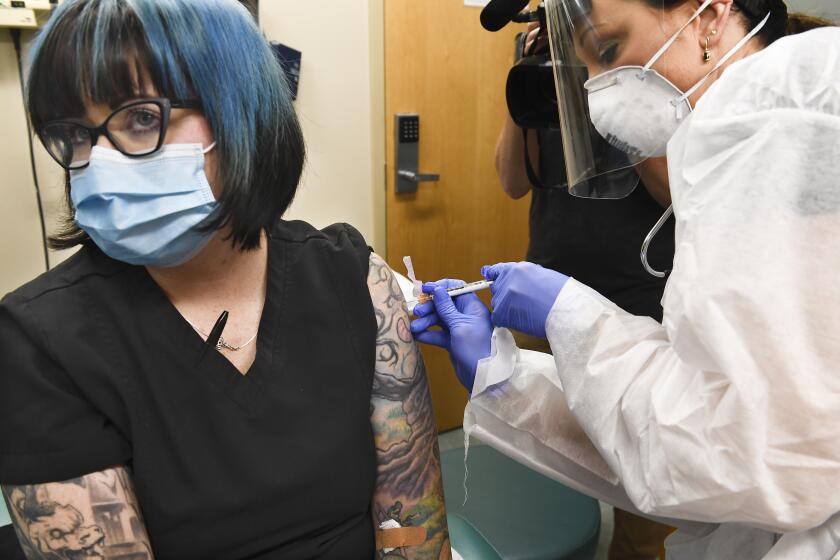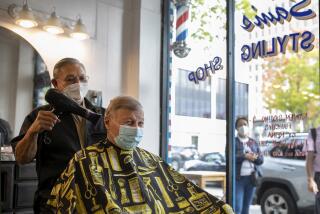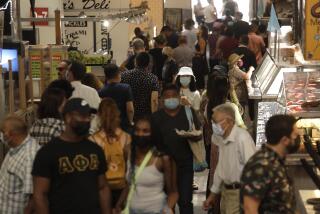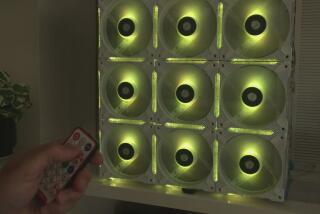Americans’ fixation on coronavirus cleansing can be overkill, experts say
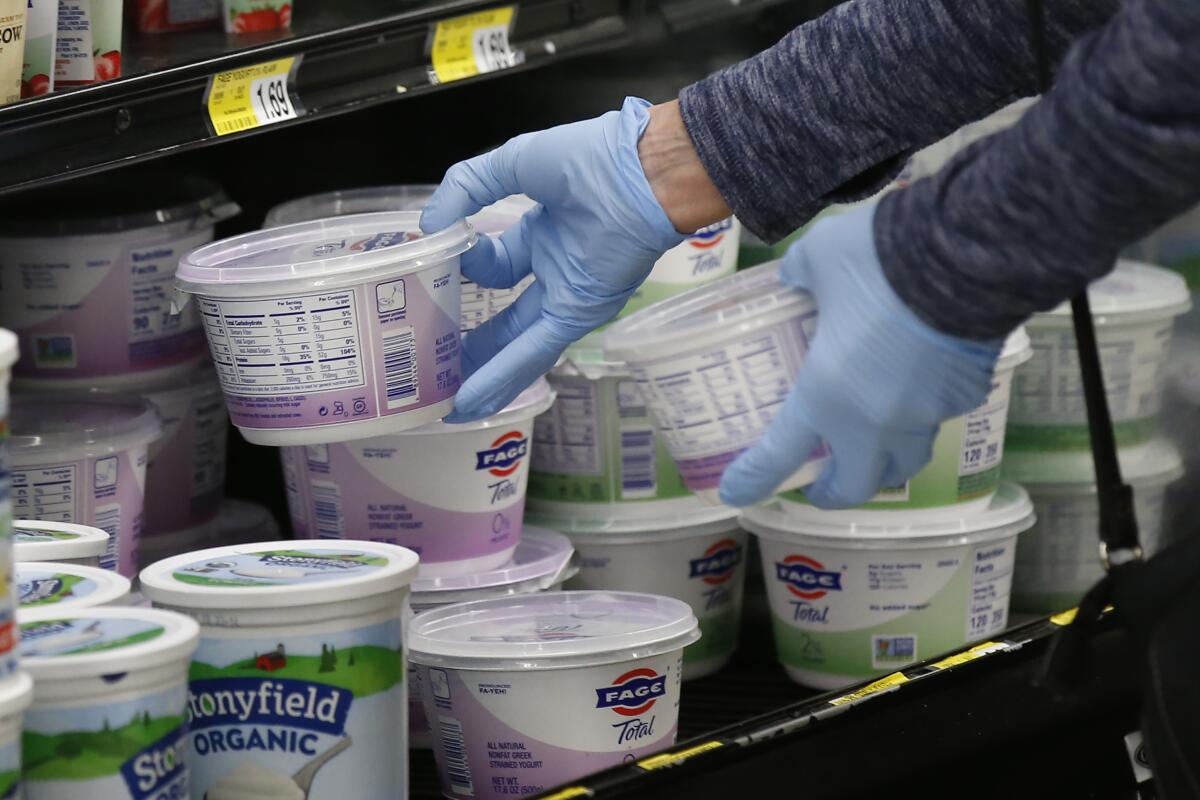
- Share via
To avoid any traces of the coronavirus that might be lurking on surfaces, Americans have been wiping down groceries, wearing surgical gloves when they go out and leaving packages out for an extra day or two after they arrive in the mail.
But experts say the national fixation on scrubbing sparked by the COVID-19 pandemic can sometimes be overkill.
“It’s important to clean surfaces, but not to obsess about it too much in a way that can be unhealthy,” said Dr. John Brooks, chief medical officer for the COVID-19 response at the U.S. Centers for Disease Control and Prevention.
Health officials knew less about the virus in the early days of the pandemic, when a run on cleaning wipes made them all but impossible to find. Since then, it’s become clearer the virus primarily spreads between people through the respiratory droplets they spray when talking, coughing, sneezing or singing. That’s why officials emphasize the importance of wearing masks and social distancing.
That doesn’t mean surfaces pose zero risk. Cleaning is still recommended, especially frequently touched spots like door knobs or elevator buttons that infected people might have recently touched.
But with COVID-19, experts say to keep the risk in perspective: The virus is fragile and doesn’t survive easily outside the body for long. Early studies finding it could linger on surfaces for days used large viral loads and were in laboratory conditions, not the real world. Other tests might just detect remnants of the virus, rather than live virus capable of infecting people.
Also, viruses don’t just leap from surfaces to infect people. Indeed, an infection requires a sequence of events: There would have to be enough surviving virus on whatever the person is touching; the person would have to get it on their hands; and then they’d have to touch their mouth, nose or eyes.
The more cases that are reported, the more deaths we would expect to see, right? The answer is both yes and no, experts said.
In other words, there could be diminishing returns to all the disinfecting — especially if people do a good job of washing their hands.
For public health experts, the challenge is telling people exactly where they should draw the line, especially if cleaning isn’t doing any harm.
What counts as overkill may also vary depending on the situation, said Justin Lessler, an expert in infectious diseases at Johns Hopkins University.
Although Lessler wouldn’t wipe down his own groceries, for example, he said it might not be a bad idea for people caring for someone who is at high risk of becoming severely ill if infected.
“These are things that maybe are on the lower end of how much they actually reduce risk,” he said. “But they’re relatively easy and cheap.”
And in nursing homes, Lessler said, being vigilant about disinfecting surfaces makes sense.
Even if it doesn’t meaningfully reduce risk, regularly disinfecting surfaces can be a way for people to exert control when they feel they don’t have any, said Stephen Morse, an infectious disease researcher at Columbia University.
In public places, stepped-up cleaning — what some refer to as “hygiene theater” — can be a way to reassure people.
“People want to make it evident that they really care,” Morse said.
But Emanuel Goldman, a professor of microbiology at Rutgers-New Jersey Medical School, said that reassurance could also create a false sense of safety — and detract from measures that matter more.
There are still many unknowns when it comes to the pandemic, but the early signs of success for two experimental COVID-19 vaccines make a few things clear.
“They worry less about what they breathe. And breathing is your primary source of infection,” said Goldman, who wrote a commentary in the journal Lancet Infectious Diseases that argued the fear of transmission through surfaces was being overblown.
“I’m not saying don’t do routine maintenance. I’m not saying don’t do cleaning. But you don’t have to go to extraordinary measures,” he said.
Still, Americans have been wiping store shelves clean of disinfecting products. Since the pandemic hit, sales have been up about 30% in Clorox Co.’s business unit that includes cleaning products.
Whether those habits will last remains to be seen.
At the start of the pandemic in March and April, when Paige Zuber returned home from her corporate food service job in New York, she said she would leave her mask in a bag by the door, immediately change out of her clothes and shower.
“It was like disinfecting chaos to make sure I was not bringing anything into our apartment,” said Zuber, who has since been laid off and moved to Rhode Island.
Zuber is still cleaning a lot more than she did before the pandemic, but she’s not going to the same extremes.
At the CDC, Brooks said he tells people to do what makes them comfortable — but to keep in mind the relative risk of different routes of transmission.
“As long as you don’t touch your face when you’re unpacking those groceries, and wash your hands afterwards and are careful, I think that may be sufficient,” he said.
